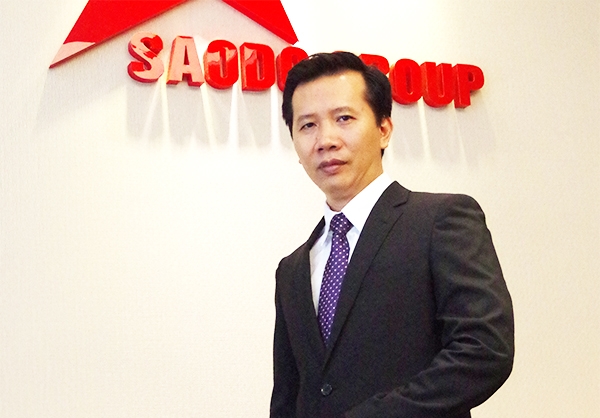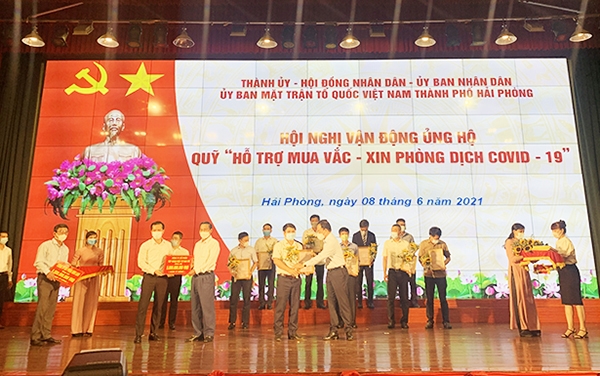Resetting focus on human resources management at industrial zones
 |
| Nguyen Thanh Phuong, general director of Sao Do Group |
As a corporation that invests and develops industrial zone (IZ) infrastructure, is Sao Do Group interested in human resources management at these projects?
At present, the first phase of our Nam Dinh Vu Industrial Park (IP) is basically occupied and we are completing infrastructure for the second phase to hand over to secondary investors. In order to attract quality investors, in line with the investment attraction orientation of the city, we are focusing on investing in modern and synchronous infrastructure by providing services such as infrastructure maintenance, wastewater treatment, electricity and water supply, warehousing system, seaport services, and port logistics. However, the management of human resources is also important at IZs. In fact, Sao Do Group always pays attention to this matter by accompanying our tenants in recruitment, training, and management support.
Specifically, we constantly support our tenants in enrolling employees – especially with new projects, by organising and participating in programmes like job fairs and recruitment days.
We have also entered a series of MoUs with a number of universities and vocational colleges in Haiphong city to cooperate with enterprises and schools in recruitment and training. Nam Dinh Vu IP is responsible for providing recruitment information of investors to universities and colleges within the city, supporting and advising tenants on training services on occupational safety and health, fire prevention, environment, as well as IZ regulations, connecting schools with investors in the IP in training, internship, and labour recruitment.
We additionally worked with the Investment Promotion and Employment Service Center of Haiphong Economic Zones Authority (HEZA) on the supply of human resources for IZs. Thereby, we can synthesise and forecast local labour resources to draw up plans and attract personnel not only in Haiphong city but also from neighbouring provinces.
Subsequently, we can organise vocational and skills training, and foreign language courses to provide quality human resources and boost work efficiency of enterprises.
What issues do you see with human resources management in IZs?
 |
| Sao Do Group has donated VND 5 billion ($217,400) to Haiphong city's COVID-19 vaccine fund |
Human resource management in IZs directly influences scale, morale, and productivity. Managements includes a chain of activities including training, recruitment, management, controlling, and taking care of the material and spiritual life of employees.
On the surface, it is simple. However, Vietnam has long been trying to offer training in a way to make supply and demand meet as well as to preclude the need for retraining by employers, with little effect so far.
Facilitating this requires smooth coordination among infrastructure developers, customers, management agencies, and training institutions. Sao Do Group, as an infrastructure developer, has been very successful in bringing together all stakeholders for success in this regard.
Notably, as quality human resources are progressively shrinking and neighbouring localities are competing to retain quality labour, training needs to be accelerated. In other words, infrastructure developers like us have to participate more deeply and become a great bridge between employers and human resources training units.
Currently, the government has a policy to encourage IZ infrastructure developers to invest in building housing, social, cultural, and sports facilities for workers in IZs and economic zones. However, the existing IZs are facing difficulties in arranging land funds as procedures take a lot of time, especially if the IZ master plan needs to be adjusted to include a housing area. Therefore, the local government needs to promptly review and replenish land funds to call for investment in such projects to serve workers in IZs.
Besides, the management of human resources is also a measure to control security and social order amid COVID-19 complications. A Committee for the Prevention and Control of COVID-19 Disease was established in Nam Dinh Vu IP to regularly monitor the situation, health, and movement of employees; to share information on the situation to keep employees fully informed of their situation and responsibilities; and draw up plans to deal with potential outbreaks.
Is the management of human resources in IZs an urgent issue today?
According to statistics of the Ministry of Planning and Investment, as of the end of May, there were 394 IZs nationwide and thousands of large and small industrial clusters have been established, attracting tens of thousands of laborers working around each IZ.
In some provinces, the contributions of IZs and economic zones account for over 60 per cent of the total budgetary revenue. Many IZs have factories that operate as part of the global production chain. Therefore, disruptions to their production can cause considerable damage to the local economy and business.
Human resources management in IZs is an urgent matter nowadays. If this issue is not addressed, social security cannot be guaranteed, with many negative impacts already having occurred. To do well in human resources management, UZ owners not only need to have tight association and coordination with an independent human resources management agency but also to have devoted support and direction from the local government. This could generate high-quality labour force that is in line with the requirements of domestic and foreign investors.
What the stars mean:
★ Poor ★ ★ Promising ★★★ Good ★★★★ Very good ★★★★★ Exceptional
Related Contents
Latest News
More News
- Canada's Komaspec invests in Haiphong manufacturing facility (October 20, 2025 | 09:28)
- Haiphong ignites innovation drive at TECHFEST 2025 (October 13, 2025 | 19:49)
- Haiphong breaks ground on landmark industrial park and LNG power plant (September 28, 2025 | 09:00)
- DEEP C partners with Signify to develop green lighting in industrial zones (August 27, 2025 | 11:01)
- Nam Dinh Vu Industrial Park taps new free trade zone to attract high-quality investment (July 29, 2025 | 14:41)
- Haiphong attracts $15.6 billion in investment (July 16, 2025 | 13:49)
- KinderWorld opens Singapore International School in Haiphong (May 13, 2025 | 14:20)
- Red Flamboyant Festival connecting milestones with ambition (May 13, 2025 | 10:08)
- Haiphong restates its goals with solid fundamentals (May 13, 2025 | 09:57)
- Heroic Haiphong stands tall (May 13, 2025 | 09:38)

 Tag:
Tag:


















 Mobile Version
Mobile Version